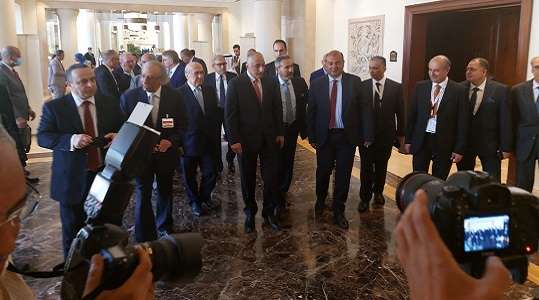The Secretary-General of the Union of Arab Chambers, Dr. Khaled Hanafi, called for “the necessity for the next stage to witness greater interest from the Arab and Chinese sides to strengthen cooperation relations in the field of digital economy and digitization in general. As well as paying attention to the clean energy sector, with a focus on the opportunities that exist in this field, as it is a fertile field for cooperation between the Arab countries and the People’s Republic of China, which is the largest trading partner with the Arab world, where the volume of trade between the two sides exceeds $200 billion.”
Hanafi's words came during a speech he delivered on the occasion of the 70th anniversary of the founding of CCPIT, which coincided with the convening of the World Trade and Investment Promotion Summit.
Hanafi pointed out that “although the balance of trade between the two sides tends to favor China in a small way, it is generally balanced, as there are great potentials for enhancing cooperation in the field of artificial intelligence, clean and renewable energy, as well as in the digital economy, this is the future that the Arab countries seek to lead vigorously, and in this field, China can contribute and participate in this qualitative leap for the Arab countries, in order to achieve common goals and interests.”
He noted that “regardless of the challenges the world faces today, and regardless of the circumstances facing the global economy, the Arab-Chinese relations continued and developed in a great and good way.” He explained that “the Arab world will witness an increase in demand for the development of infrastructure in the information sector, which means huge opportunities in the market for both sides. In addition to the fact that now, in light of the international consensus on the need to act in the field of combating climate change, it is necessary to expand the scope of reliance on renewable energy, and this should be our common direction. As this is critical to matching our energy transition goals, and building resilience in the energy industry. Moreover, we must work to support our common missions for a sustainable and peaceful future for all.”
At the conclusion of his speech, Hanafi stressed that "the Arab countries are open to cooperation with China, and we always strive to increase the volume of cooperation between the two sides in various fields, not only in the narrow and limited commercial field, because what we aspire to is that the relationship between the two sides will turn into the limits of partnerships. and strategic alliances, as China has a promising economic future at the global level."
In parallel, the Secretary-General of the Union participated in the Arab Banking Conference for 2022, hosted by the Arab Republic of Egypt, during the period 18 and 19 May this year, entitled: The repercussions of the international crisis and its impact on economic conditions, This was under the patronage and presence of the Governor of the Central Bank of Egypt, Tariq Amer, Executive Director of the International Monetary Fund, Dr. Mahmoud Mohieldin, Chairman of the Board of Directors of the Union of Arab Banks Sheikh Mohamed Jarrah Al-Sabah, and Chairman of the Board of Directors of Banque Misr Mohamed El-Etreby, representing the Federation of Egyptian Banks.
A session entitled: "The risks facing global economic growth in light of the international geopolitical crisis" was held. It was chaired by the Chairman and CEO of Banque du Caire Tarek Fayed, and during this session, the Secretary-General of the Union of Arab Chambers, Dr. Khaled Hanafi, and the Secretary-General of the Arab-Brazilian Chamber of Commerce, Tamer Mansour, and Director of the Department of Economic Integration, League of Arab States, Dr. Bahjat Abu Al-Nasr, spoke.
Speakers in this session discussed the emerging reality as a result of the emergence of new economic and financial alliances and blocs, the decline in global economic growth as a result of the crisis, and the effects of the crisis on poor and highly indebted countries.
Source (Union of Arab Chambers)

